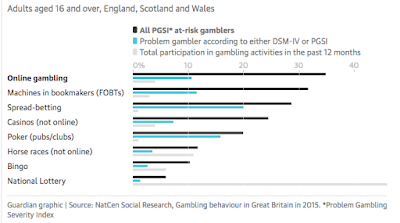Is this the slippery slope I see before me? .. Yesterday, FOBTs were a uniquely evil gambling product that allowed people to spend £100 in 20 seconds. Today, it has been noticed that you can bet 10 times that amount in half the time on your mobile phone. At 7am this morning, the government had bravely decided to rid Britain of the greatest cause of problem gambling the country had ever seen. By 10am, expectations were being managed and we were hearing the same slogans that always follow nanny-state announcements. They are the same slogans we heard two weeks ago when minimum pricing was introduced in Scotland and the same slogans we heard a month earlier when the sugar tax began: ‘No silver bullet… You’ve got to start somewhere… This is a good first step…’. And so it begins.
Sure enough, today's Guardian editorial is drooling over the prospect of clamping down on gamblers and the gambling industry...
Britain should follow Australia’s lead in banning gambling adverts around live sporting events, but even that is not enough while firms can plaster their names across football shirts and grounds... It is possible that Thursday’s decision on FOBTs could prod the sector into curbing its excesses, recognising that a failure to regulate itself will bring fresh pressure and, ultimately, further action by the government. It seems more likely that – as for its customers – the lure of a big payout may overcome rational judgment. The government is right to make it clear that “responsible gambling” is a matter for the industry, not just individuals. If the firms will not shape up, they must be forced to do so.
Meanwhile, the Times is celebrating a 'victory for morality over money' and eyeing up the internet...
Regulation is not always seen as unwelcome meddling and this should be a lesson for a government often too timid to intervene in the market when the social good or competition requires it.Yet there is a fundamental flaw in looking at betting machine stakes in isolation: almost every person now has the potential for a FOBT in their pocket with the proliferation of smartphone casino apps. Many of these allow significantly more than £100 a spin. Whether ministers have the will to take on this fight as well remains to be seen.
Tracey Crouch, the minister who fought hardest to rid Britain of FOBTs, has signalled that she is keen to make yesterday's announcement the start of a wider battle against gambling, starting with the lottery...
UNDER 18s will be banned from playing National Lottery games under a radical gambling shake-up unveiled by ministers yesterday.The Culture Minister Tracey Crouch said she will “gather evidence” on the effect they have on younger teens currently allowed to play.
.. It has been criticised in the past for “luring” kids into gambling with scratchcards based on games such as Monopoly.
It looks open season on gambling. It seems to me that the bookies' rivals in the gambling sector have made a mistake by backing the anti-FOBT campaign. The campaign has created the illusion of a problem gambling epidemic despite rates of problem gambling being essentially static for twenty years. There is no reason to think that the rate of problem gambling will decline in the next few years and when it doesn't, the government will look for other targets.
There are plenty of them. If FOBTs are fair game, so are lots of other gambling activities. Anti-FOBT campaigners claim that problem gambling is more prevalent among gamblers who play the machines than those who engage in any other form of gambling but, like much of what they say, this is not true. To quote the most recent evidence from NatCen:
The highest rates of problem gambling were among those who had participated in spread betting (20.1%), betting via a betting exchange (16.2%), playing poker in pubs or clubs (15.9%), betting offline on events other than sports or horse or dog racing (15.5%) and playing machines in bookmakers (11.5%).
These statistics don't tell you anything about what 'causes' problem gambling. Problem gamblers tend to play lots of different games and the more niche the game, the more likely you are to find problem gamblers playing it. And, for all their notoriety, FOBTs are fairly niche. Fewer than five per cent of the population play them in any given year.
Nevertheless, if the government thinks that it can address problem gambling by stamping out the activities in which problem gamblers are over-represented, it's got four targets to aim for. And if it wants to tackle people who are 'at risk of problem gambling' - a fictitious new category that has been invented to inflate the scale of the problem - online gambling is at the top of the list.
This suits Derek Webb, the founder of the Campaign for Fairer Gambling, who last year promised to go after online once he'd finished with the bookies. British casinos, arcades and pubs have little to fear from a campaign against internet gaming and may feel that they are already so tightly regulated that there is little more the government could throw at them.
That may be true in the short term. Online seems the obvious next target, but further advertising restrictions would affect the whole industry and the hoo-ha about FOBTs seems to have made the government wary of allowing higher stake limits on other gambling machines. A general climate of hysteria about gambling helps nobody except those who have a moral revulsion against gambling - of whom there seem to be many.


No comments:
Post a Comment